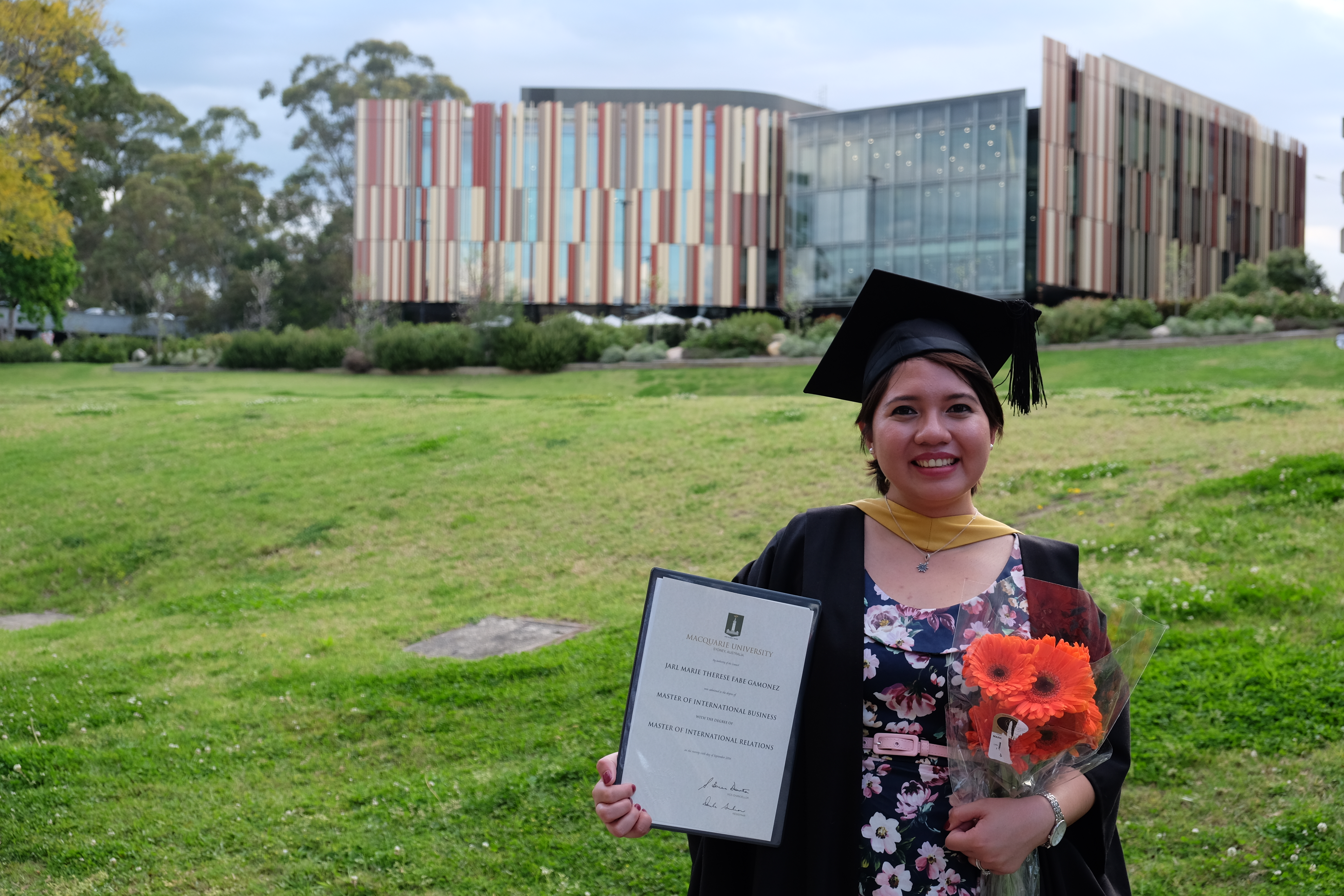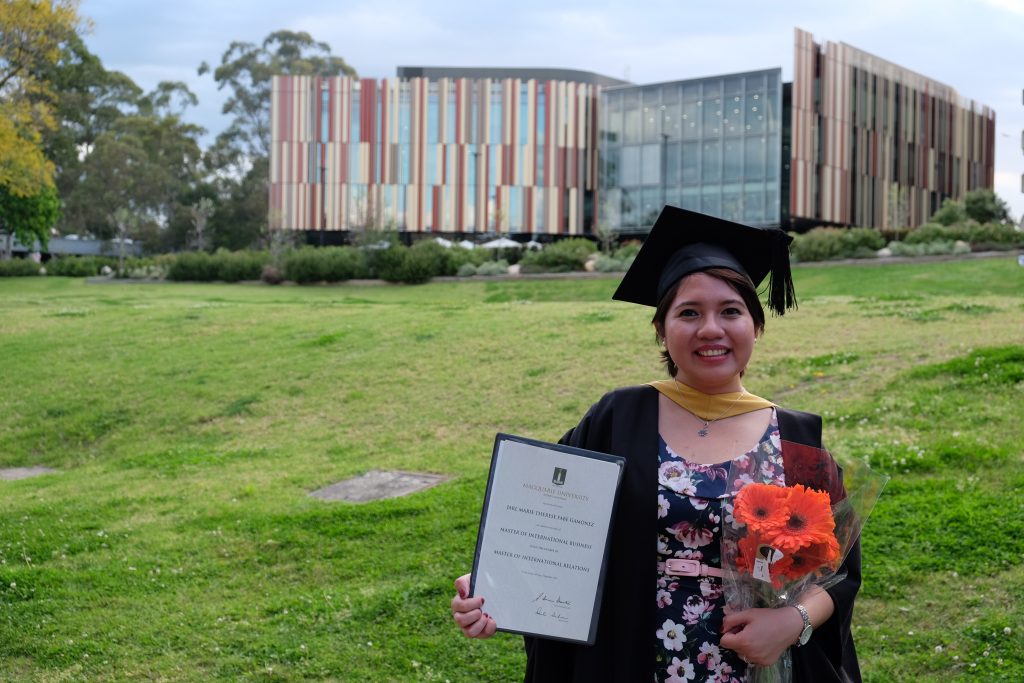
Note: I am writing this entry not in a professional capacity and am writing from personal experience. This post is not to be affiliated with CDU Global nor Macquarie International and is not to be regarded as a guideline for securing a positive visa outcome nor migration outcome in Australia for the future.

Macquarie University
September 2016
I want to study in Australia, but where do I begin?
As a former international student and now working in the international office of a university, I receive this question several times. In the interest of everyone enquiring and responding to similar queries in a consistent and detailed manner, I have prepared this blog entry.
First question to ask, what do you want to study?
Sounds easy but looks more complicated than it seems. Either you follow through from your previous studies by going to a similar field of study or you dive into that long-awaited program you’ve been wanting to undertake. You could easily get bogged down by the number of program offerings by different universities in Australia, but as long as you know which field you’re interested to study, it’s easier to funnel down the university choices since not all unis offer the same set of courses. I’ve always wanted to study International Relations, so I applied for admission in Monash University, University of Melbourne and Macquarie University.
Second question, when do you want to start?
Big universities in Australia normally have 2 commencement intakes: Semester 1 in February/March and Semester 2 in July/August. Not all courses have 2 intakes in a year so better confirm that important information as well.
Third question, do you meet the entry requirements of the course?
Not all courses have the same entry requirements, that’s why I asked you to pick your course first before anything else. Once you’ve chosen a course, the university providing that course will list its specific ACADEMIC and ENGLISH entry requirements for that course. It is important to note that being a Bachelor degree holder from the Philippines does not automatically qualify you for a Master’s program in Australia, since not all Bachelor degrees in the whole wide world were created equal. In short, your Bachelor degree in the Philippines might not be considered equivalent to an Australian Bachelor degree. How do you know if you meet the admission requirements?
YOU NEED TO APPLY FOR ADMISSION.
This is where getting an education agent in the Philippines comes in handy, because most, if not all, universities in Australia require an education agent before you can apply for admission in the university. Take note that an education agent is not the same as a migration agent. Your education agents are not there to advise which program to take that may help you secure further stay or permanent residency in the long run in Australia. Since them doing so is a breach of their professional obligation to you as their client and to the university they represent.
And ensure that the education agent is an AUTHORISED REPRESENTATIVE of the university in the Philippines. How do you know if your agent is an authorised agent? Check the university’s website. This is how it looks like for Macquarie University and Charles Darwin University.
I got an agent in Makati when I applied for admission from 3 universities. I didn’t have to pay any processing or service fees, only $100 application fee for each university I applied for. Since I applied for 3 universities, I paid $300 to the agent. Getting an agent also makes the process much easier and hassle-free because instead of contacting the university directly for any query you may have with your application, your agent can act on your behalf. So be sure to do your research on which agent to get as this can make or break your application to study in Australia or overseas in general.
Fourth question, how much is required for study in Australia?
According to the Department of Home Affairs website (archived), you need to have sufficient money to cover for your study, travel and living costs. Course fees vary depending on the program and duration of the program. Of course, the longer the program, the cost would be higher as well. Please note that the tuition fees you pay as an international student is totally different from the fees which domestic students (Australian permanent residents and Australian citizens) pay for their study so don’t be surprised if you see different course fee figures in the university’s website. You do not need to pay for the entire course fees for the entire duration. Usually, what universities require upon receiving an offer is 1 semester’s worth of course fees and your Overseas Health Cover (OSHC). OSHC is something you cannot do away with because it is a compulsory requirement for all student visa holders to obtain one. This is also for your own benefit, because getting sick in Australia without medical insurance is EXPENSIVE!
Fifth question, are there scholarships?
Some universities offer scholarships, but these are only partial scholarships i.e. you still have to pay for most of the course fees. So you can’t rely on these partial scholarships to cover your studies in Australia. If you’re after full scholarships, best to look at the Australian Government’s fully-funded Australia Awards program.
Once you have applied for admission, have met the entry requirements of the program, you can then be eligible for either a CONDITIONAL or UNCONDITIONAL/FULL LETTER OF OFFER. Carefully read through everything that’s written in that document. Especially if you decide to accept the offer, carefully read through the Terms of Agreement before signing and paying anything since it serves as a binding legal document between you and the university.
Once you have accepted your offer and paid your fees can you be issued a CONFIRMATION OF ENROLMENT, the single most important document you will need to lodge your student visa application with the Australian Government’s Department of Home Affairs. Congratulations!
Hope this information helps, feel free to share. If you have any questions, feel free by leaving a comment below.
Interesting and refreshing to know. Thank you Jarl!